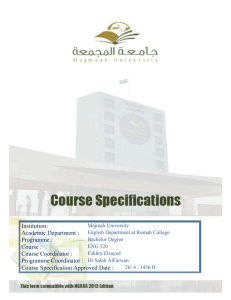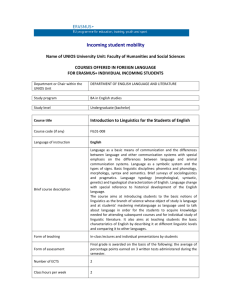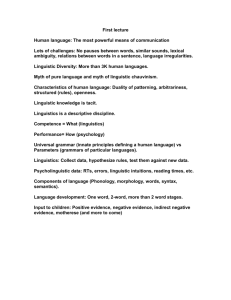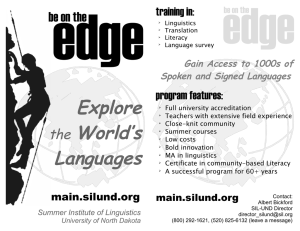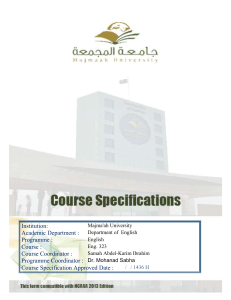Document 15334596
advertisement
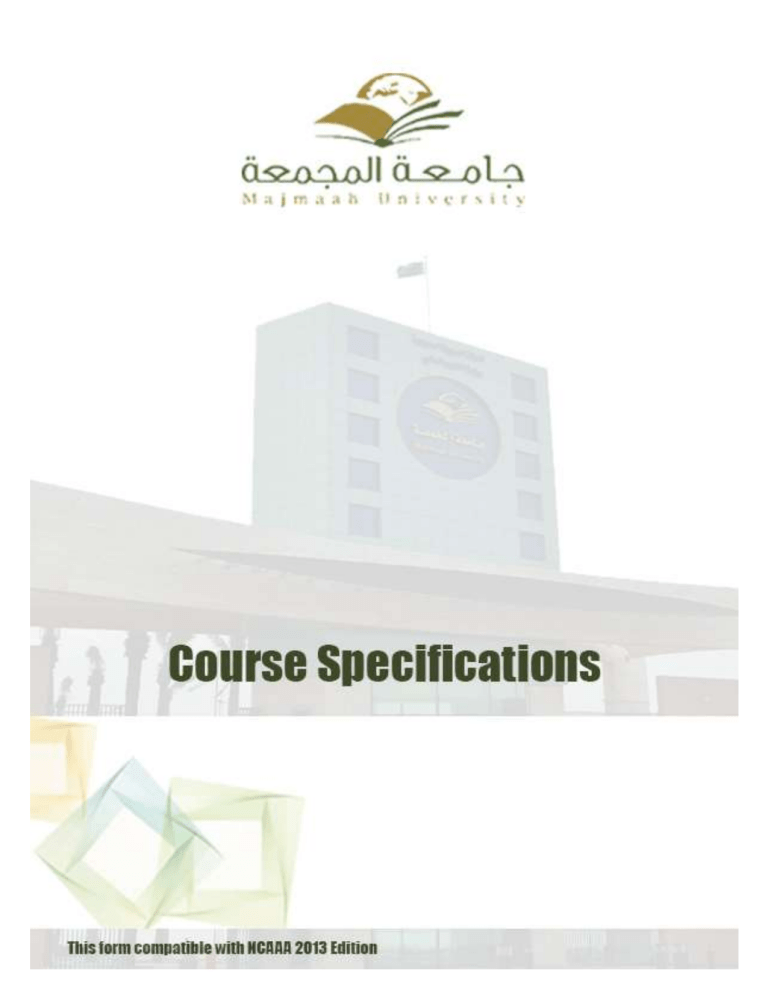
Majma’ah University College of Science and Humanities – Rumah Campus . Department of English B.A in English Programme : Linguistics III Course : Fakhry Elieba Course Coordinator : Programme Coordinator : Dr.Salah Alfarwan 10/11 / 2015 Course Specification Approved Date : Institution: Academic Department : A. Course Identification and General Information 1. 1 - Course title : Linguistics III Course Code: Eng. 427 2 hours 2. Credit hours : 3 - Program(s) in which the course is offered: B.A in English Language 4 – Course Language : English 2. 5 - Name of faculty member responsible for the course: Fakhry Elsayed Level 7/ 4th year 3. 6 - Level/year at which this course is offered : 7 - Pre-requisites for this course (if any) : Eng. 320 Linguistics I , Eng. 323 Linguistics II 8 - Co-requisites for this course (if any) : 9 - Location if not on main campus : ) Rumah Campus ( 10 - Mode of Instruction (mark all that apply) A - Traditional classroom B - Blended (traditional and online) D - e-learning E - Correspondence F - Other X What percentage? 90 % X What percentage? 10 % What percentage? 0% What percentage? 0% What percentage? 0% Comments : ........................................................................................................... B Objectives What is the main purpose for this course? Students should be able to: 1. Identify the basic principles characterizing each of the various schools of linguistics. 2. Provide an explanation of the different linguistic theories. Page2 Of 8 3. Compare and contrast the various linguistic approaches. Briefly describe any plans for developing and improving the course that are being implemented : 1. Increased use of IT or web-based reference material 2. Use Web-CT for uploading material 3. Consistently change the list of readings. C. Course Description 1. Topics to be Covered List of Topics Definitions and background of syntax, emantics and prags Dexis and distance Reference and Interference Reference and Interference presupposition and entailment cooperation and implecature speech acts and events politness and interaction politness and interaction conversation and prefrence structure Discourse and culture Rivision Rivision No. of Weeks 1 1 1 1 1 1 1 1 1 1 1 1 1 Contact Hours 2 2 2 2 2 2 2 2 2 2 2 2 2 2. Course components (total contact hours and credits per semester): Lecture Page3 Of 8 Tutorial Laboratory Practical Other: Total Contact Hours 26 hours None None Credit None None None None None None 26 hours 2 2 3. Additional private study/learning hours expected for students per week. 2 hours 4. Course Learning Outcomes in NQF Domains of Learning and Alignment with Assessment Methods and Teaching Strategy NQF Learning Domains And Course Learning Outcomes 1.0 Knowledge 1.1 Compare and contrast the various linguistic approaches. 1.2 Identify pragmatics and its different approaches 2.0 Cognitive Skills 2.1 1. Ability to think critically and analytically. Course Teaching Strategies Course Assessment Methods Lectures. Class discussion. Assignment. Midterm exams. Final exam. Class discussion. .................. Lectures Class participation and discussion. 2. Assignments. 3. Midterm exams. 4. Final exam. 2.2 2. Ability to make comparisons between different approaches Class discussion. .................. 2.3 to the study of language. 3. Ability to apply theoretical knowledge to texts. Individual meetings with students 3.0 Interpersonal Skills & Responsibility 3.1 The ability of students to complete both reading and writing Lectures assignments in due time. This gives evidence of their which Page4 Of 8 .................. in Active class students participation Course Teaching Strategies responsibility. are made aware of the significance of time management 2. The ability of students to participate in class discussion. Class discussion This creates cooperation NQF Learning Domains And Course Learning Outcomes 3.2 Course Assessment Methods reflects the students’ ability to keep up with the reading Schedule Research papers will attest to the student’s ability to fulfill assignments and respect dead lines 4.0 Communication, Information Technology, Numerical Encourage 4.1 Use of Academic English 4.2 . Use of the computer and internet to gather information. 5.0 Psychomotor 5.1 None Set particular students to make points on extensive use of whether the online material above methods for obtaining material have been implemented. Encourage .................. students to consult the specialist in the computer lab for help on web based material. None None 5. Schedule of Assessment Tasks for Students During the Semester: 1 2 3 Page5 Of 8 Assessment task Week Due Proportion of Total Assessment 1st Mid exam Week 6 20% 2nd Mid exam Week 13 20% All along 10% All along 10% Class participation and attendants Assignments 4 Final exam At the end of term 40% D. Student Academic Counseling and Support Teacher is available 2 office hours weekly. Also students can reach the teacher via email. E. Learning Resources 1. List Required Textbooks : -Gorge Yule –Pragmatics 2. List Essential References Materials : None 3. List Recommended Textbooks and Reference Material : Matthews, P. H. The Concise Oxford Dictionary of Linguistics, Oxford University Press. 4. List Electronic Materials : None 5. Other learning material : None F. Facilities Required 1. Accommodation Lecture room that accommodates the number of registered Students. 2. Computing resources Projector. Smart board. 3. Other resources None Page6 Of 8 G Course Evaluation and Improvement Processes 1 Strategies for Obtaining Student Feedback on Effectiveness of Teaching: . Midterm evaluation feedback form to increase instructor’s awareness of the weak and strong points of the class. . End of term college evaluation of the course by students (to be collected by the department) End-of-term debriefing in class of students and teacher regarding what went well and what could have gone better. 2 Other Strategies for Evaluation of Teaching by the Program/Department Instructor : Peer observation to benefit from colleagues’ objective feedback and suggestions for improvement. 3 Processes for Improvement of Teaching : 1. Training sessions. 2. Workshops to facilitate the exchange of experiences amongst faculty members. 3. Regular meetings where problems are discussed and solutions given. 4. Discussion of challenges in the classroom with colleagues and supervisors. 5. Encouragement of faculty members to attend professional development conferences. 6. Keep up to date with pedagogical theory and practice. 7. Set goals for achieving excellence in teaching at the beginning of each new semester after reviewing last semester’s teaching strategies and results. 4. Processes for Verifying Standards of Student Achievement Check marking of a sample of examination papers either by a resident or visiting faculty member. Students who believe they are under graded can have their papers checked by a second reader. 5 Describe the planning arrangements for periodically reviewing course effectiveness and planning for improvement : . Compare syllabi and course description with other universities (including those on the net). . Bi-annual meetings of faculty members to discuss improvement. Have a curriculum review committee to review the curriculum periodically and suggest improvements. Page7 Of 8 Course Specification Approved Department Official Meeting No ( ….. ) Date … / …. / ….. H Course’s Coordinator Name : Fakhry Elieba Signature : ........................... Date : 10/11 / 2015 Page8 Of 8 Department Head Name : Signature : Date : Dr.Salah Alfarwan .......................... …./ … / …… H
